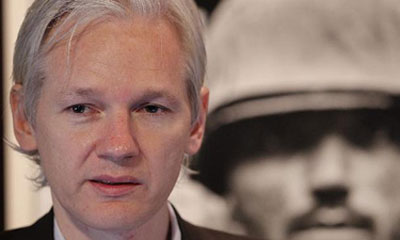

We Are Also Zhou Libo
By Huang Xiaowei 黄小伟 Comment, page 16
Comment, page 16
~The popular Shanghai stand up comedian Zhou Libo stirred up controversy recently when he criticized the internet as a "public toilet" where anyone can spite others maliciously while writing in his microblog. He also said it would be wrong for the government to take online opinions seriously.
~The war of words about what Zhou Libo said on the web has finally been bought an end. The whole event is like a lesson, and Zhou Libo is like a mirror that reflects what we are. In fact we are also Zhou Libo.
~ In comparison with other celebrities who keep silent when they are confronted with doubts, Zhou launched a verbal battle fearlessly.
~Online, we have greater freedom of self-expression, and can be rude or sophisticated, so we are all Zhou Libos, saying things from our heart over the internet.
Original article: [Chinese]

WikiLeaks: Information Terrorism or Democratization of Information?
By Li Xang 李翔
Comment, page 16
~The bitter dispute over WikiLeaks is still ongoing, which whether WikiLeaks is destroying the world or repairing it.
~The Washington Post and New York Times faced this similar situation when they published The Pentagon Papers, the publication of The Washington Post was within an inch of being stopped.
~ WikiLeaks founder Julian Assange believes that open and transparent information can change the world and that he will reveal the hidden information and inaccuracies of the organizations that break the law, and put massive pressure on them.
~Sarah Palin has demanded that Assange is hunted down like Osama bin Laden, and she regards the incident as on the same level as a terrorist movement.
~Let us not go into the question of Information terrorism or democratization now, but acknowledge that the world is not that transparent and many more want it to be more so.
Original article: [Chinese]
 China Unicom's iPhone Service is in Trouble
China Unicom's iPhone Service is in Trouble
By Chen Tairan 陈泰然
Economic Observer Online
~China Unicom iPhone4 consumers spent 3900 yuan writing 3 microblog message while on a business trip in Russia.
~If a consumer is found to use the iPhone with another operator's SIM card, the consumer's China Unicom cell number and phone will be locked and a penalty will be imposed after the phone is without its original SIM card for 90 days.
~When China Unicom, the country's second largest mobile carrier and official partner of the iPhone in China, aimed to become the phone provider of young and high-end users, they were supposed to provide high quality service and satisfy the individual needs of consumers.
~But facing the charge of having unreasonable fees they just say their actions were in accordance with industry practice, which is nonsense.
~If you can't stand the heat, get out of the kitchen. China Unicom should pay more attention on their consumers.
Original article: [Chinese]
Will the Craze for Civil Servant Jobs Block the Development of Society?
By Yang Tao 杨涛
Economic Observer Online
~The 2011 national civil servant examination kicked off on December 5th with hundreds of thousands of examinees. 1,030,000 qualified people sat for the exams for 160,000 jobs. This means that on average 64 examinees are competing for every position according to the Beijing News.
~Many people are concerned with the popularity of the exam, saying that the craze for the civil servant examination will block the development of society, a charge that is denied by Nie Shengkui, director of the examination and the recruitment department of the State Administration of Civil Service (SACS). He said it is commonplace for a country's government to lure talent into its civil service.
~Nie thinks about the issue as the director of the civil servant examination and perhaps overlooks the trend that the number of applicants has increased 16 times since 2003 to 1.41 million.
~What's behind the popularity of the civil servant examinations and what negative effects will it bring to the long-term development of society?
~Civil service provided by public servants does not produce any social property and wealth. The growth of wealth depends on the setup of business and accumulative innovative efforts. If a large amount of talented people swarm to work in government, who will create societal wealth?
~Many talented people rushed to get government jobs not because they are relatively low risk and well paid, but for the fact that the position includes the power to control many resources and the distribution of resources, a power that means citizens can barely set up their own businesses.
~Moreover, civil servants have a lot of opportunity for "hidden income" (rewards they receive by taking advantage of their position).
Original article: [Chinese]
Tax Reform Should Focus on Reducing Tax Burden
By Yi Peng 易鹏, Financial Commentator
Economic Observer Online
~ Earlier this week, the head of a research office under the State Administration of Taxation advocated for tax reform in a speech given to an international forum. Among other things, he argued that China's income from financial tax is still a little low.
~ China's current tax system is based on the series of reforms introduced in 1994 aimed at increasing revenue and also the proportion of revenue collected by the central government. By 2009, fiscal income amounted to more than 20 percent of the country's GDP and the proportion of central government revenue as a total of national revenue has also grown steadily. From this perspective, the '94 tax reforms have achieved their goals.
~ But new problems have since emerged. The biggest problem is that the various levels of local government lack the revenue to cover the costs of the services and infrastructure they're expected to provide - this has helped contribute to the swift rise in housing prices as local governments turn to leasing land-use rights as their primary source of income. In 2009, governments nationwide sold a total of over 1.4 trillion yuan worth of land-use rights.
~ A second problem is that ordinary tax payers feel that their personal tax burden is too high. The current tax system can be decribed as having a "broad tax base with high tax rates." High tax rates squeeze the income of both enterprises and the common people. If nothing is done to change the situation, the phenomena of a rich state with poor citizens could continue to worsen.
~ The four principles that we should follow when considering any tax reform are a simplified system, broader tax base, lower rate of tax and stricter tax collection.
~ If we follow these principles, the long term trend will be for a gradual reduction in taxes.
~ Finally, transparency in the tax system is the key to tax reform; or the reform will never be significant.
Original article: [Chinese]

